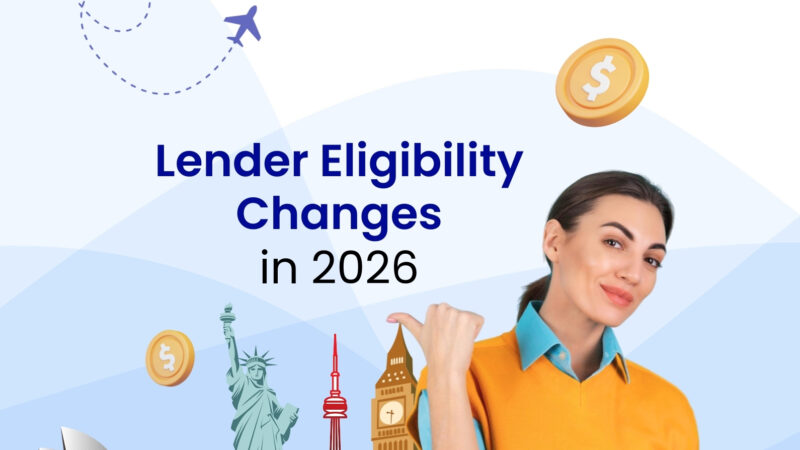Education Loan options for MBA Abroad
Summary: Understand your education loan options to study an MBA abroad with minimal interest rates and maximum benefits. This guide gives you insights about the top loan options, eligibility criteria, documents required, application process, & selecting your ideal loan options.
Studying for an MBA abroad is a great career choice for better opportunities and learning. But for many students, financial concerns often pose a challenge to MBA dreams abroad. To overcome the financial challenge, students can apply for education loans and resume their academic pursuits abroad.
As MBA admission sessions for prominent universities abroad are going on, we encourage you to apply timely without missing your opportunities. Get introduced to education loans for an MBA abroad and start your application easily with Nomad Credit’s personalized assistance.
Explore Education Loan Options!
Types of Education Loans
Broadly, there are two types of education loans for MBA abroad: Secured and Unsecured. You can apply for secured education loans from public and private banks and NBFCs, while unsecured education loans can be from public and private banks, NBFCs, or international lenders.
Secured Education Loans
A secured education loan, also referred to as a loan with collateral, requires the borrower to offer collateral. In India, many public and private sector banks require students to pledge collateral for education loan more than INR 7.5 Lakhs. The collateral can be tangible or intangible, such as a plot, a building, fixed deposits, government bonds, etc.
- The approval process for this type of loan is typically lengthier because the bank needs to meticulously verify all documents pertaining to the collateral being pledged.
- Secured education loans have higher approval chances as an asset is being pledged as loan risk guarantee
- These types of loans come with high amount and lower interest rates, compared to unsecured options.
Unsecured Education Loans
If you don’t have collateral to pledge for an education loan, consider an unsecured education loan. The education loan is provided at the security of your co-borrower’s income. These loans necessitate a minimum co-borrower income to ensure smooth repayment. Plus, your co-borrower’s CIBIL score is a crucial factor in determining your loan eligibility.
- The maximum loan amount and interest rates vary from lender to lender. For example, it is not a good idea to consider a public bank for unsecured education loans as many of them offer only up to INR 7.5 Lakhs.
- The loan processing time is lesser compared to secured education loans as there is minimum paperwork involved
Eligibility Criteria
What are the eligibility requirements for MBA abroad education loans? Here are the general criteria:
- Be an Indian citizen
- Minimum 18 years old when applying
- Have a bachelor’s degree with a minimum of 60%
- Receive an admission offer from an overseas institution
Apart from these, there will be more requirements to be fulfilled by different lenders. It can be regarding your co-borrower income, CIBIL scores, collateral-related documentation, & entrance test score. Make sure you have the knowledge regarding eligibility before starting the application.
Read More: Education Loan Eligibility
Documents Required
- KYC documents: KYC (Know Your Customer) documents are your identity proof for an education loan. The lender needs KYC documents from you and your co-borrower. The KYC documents are Aadhar card, PAN card, Voter ID, Valid passport copy, etc.
- Academic documents: Your academic documents are crucial to applying for an education loan for an MBA abroad. They include bachelor’s (for Postgraduate programs), +2, and SSLC certificates. You need to submit a gap certificate in case you have an academic gap.
- Entrance test certificates: To apply for education loans for an MBA abroad, you must submit entrance test scores to the lender. These tests include GRE or GMAT and English proficiency tests like IELTS, TOEFL, PTE, Duolingo, etc.
- Financial documents: Financial documents are mostly asked from your co-borrower to ensure education loan guarantee. For salaried co-borrowers, the required documents include last 3 months’ salary slips, IT Returns for last 2 – 3 years, bank statements for the last 6 months, and a brief asset and liability statement. Documents from self-employed co-borrower include business address proof (GST certificate/ MSME certificate/ Utility bill), TDS Certificate (Form 16A), IT Returns, and other applicable certificates if necessary.
- Collateral documents: If you need a secured education loan for an MBA abroad, submitting complete documents of the collateral is a deciding factor. Here’s the collateral document checklist for secured education loans:
For tangible, concrete collateral such as a plot or building, you need certificates like Title deed & Sales deed, registration receipt, allotment letter, chain deed for the last 30 years, tax copy or electricity bill, government approved building plan, and Occupancy Certificate and Completion Certificate if the property is constructed and more, depending on your unique case.
For liquid collateral like a fixed deposit, your documents include an FD certificate and bank account details. For policies and bonds, you need respective certificates to act as proof of education loan security.
Read More: Documents Required for Education Loans
Application Process
Are you searching for education loan options to study MBA abroad? Here’s the good news – your search is made a cakewalk. With Nomad Credit, get customized education loan support for your MBA study abroad at a top college.
- Profile evaluation to explore top loan options
- Guidance to find minimal-interest education loan options
- Hassle-free counseling and support
- Save money! Zero-cost services guided by expert counselors
Top Education Loan Lenders
Choosing the right lender can help you save money on education loan repayment. Your right lender is that option with a high loan amount and the least interest rates. Depending on your needs and choices, the following lenders can be the right choice for your MBA abroad needs:
| For Secured Education Loan | For Unsecured Education Loan |
| Public Sector Banks Private Sector banks |
Public Sector Banks Private Sector Banks NBFCs International Lenders US Banks (for US study only) |
Public Sector banks
Against collateral security, public sector banks offer education loans of high amounts with the least possible interest in the market. These loans are also eligible for tax reduction under Section 80 E, allowing you to save the tax you pay for the loan interest amount. However, except for a few options, public banks are limited to INR 7.5 Lakhs for unsecured education loans abroad.
Private Sector Banks
Private sector banks are prominent choices for secured and unsecured education loans. However, for unsecured education loans, private banks set eligibility requirements high and will have a list of eligible courses and universities abroad. These loans are also eligible for tax reduction under section 80 E.
NBFCs
According to CRISIL (Credit Rating Information Services of India Limited), NBFC education loans are expected 35% growth to reach the mark of INR 35 Cr in disbursement in this fiscal year. These education loans are offered without collateral and mostly cover 100% expenses. Compared to banks, NBFCs offer education loans with less paperwork and a speedier process.
International Lenders
International lenders offer education loans for MBA abroad without collateral security or coborrower requirement. The amount will be high and cover 100% of your expenses in usual cases. Fast processing is an advantage of international lenders, while a high rate of interest in foreign currency is a challenge.
US Banks
To help students study MBA in US business schools, prominent US banks lend education loans to international students with a US citizen or permanent resident as coborrower. If your documents are right, you will get a high amount without delay.
How to Choose Your Lender?
Deciding your education loan lender for MBA abroad is dependent on various factors. You need to consider
- Interest rate: You must apply for the minimal-interest education loan option for overseas MBA. Since the total loan amount will be high, even a small difference in the interest rate can impact a huge amount in repayment.
- Loan repayment tenure: Your education loan repayment must be sufficient for your repayment capacity. Typically, the repayment period is 10 – 15 years. Choose an option that aligns with your loan repayment plans.
- Moratorium period: Moratorium period refers to your course duration plus a grace period of 6 – 12 months after studies. Students need not repay the loan during the moratorium period. However, in most cases, there will be a Simple Interest to be paid.
- Tax reduction: Education loans from banks and a few NBFCs come with a tax reduction under Section 80 E of the Income Tax Law. While choosing your option, prioritize those with tax reductions to save money in repayment.
- Margin money: Margin money refers to the amount you need to add by yourself to your education funding. Typically, the money margin will be 5% – 15% of the loan amount. Also, many lenders do not charge margin money and offer 100% finance for your MBA studies abroad.
- Processing fee & hidden charges: It is important to check for hidden charges and processing fees. Many lenders charge around 1% – 5% in loan processing fees, which may be added to your repayment.
Choosing the Right Lender: Features of Education Loans for MBA Abroad
As mentioned, it is crucial to choose the right lender for your MBA abroad education loan. You need to cross-check the important parameters for saving more in loan repayment. The following table gives a gist of top features of education loans for MBA abroad from different lenders in the market:
| Features | Public banks | Private banks | NBFCs | International lenders |
| Maximum loan amount | Up to INR 1.5 Cr | Up to INR 60 Lakh – 1 Cr Approx. | Up to INR 40 – 60 Lakh Approx. | 100,000 USD (INR 83 Lakh Approx.) |
| Loan type | Secured & Unsecured | Secured & Unsecured | Unsecured | Unsecured |
| Interest rates | 9.5% – 10% | 10.28% – 12.5% | 10.5% – 13.5% | 11% – 20% APR |
| Processing fee | INR 10,000 | 1% of the loan amount | 1% of the loan amount | 5% of the loan amount |
| Repayment tenure | Up to 15 years | Up to 15 years | Up to 15 years | Up to 10 – 20 years |
In short, choosing the right education loan requires meticulous evaluation and careful application. That’s why we offer you complete guidance from the start. Once you join us, an expert counselor will evaluate your profile and guide you personally till the education loan is disbursed. Transform your MBA overseas education loan application into a streamlined and stress-free procedure – join us now.

Frequently Asked Questions
Am I eligible for an education loan for an MBA abroad?
If you have the basic eligibility requirements, you are eligible for an education loan for studying MBA in a foreign university. Check your eligibility with Nomad Credit to learn more.
What is the maximum amount for MBA abroad education loans?
The maximum amount for overseas MBA education loans varies with lenders. It can be from INR 20 Lakhs to 1.5 Cr, depending on the lender.
Is there a 100% education loan for MBA abroad?
Yes, there are education loans that offer 100% coverage of your expenses to study MBA abroad.
What is the repayment period for an education loan to study MBA overseas?
The repayment period of education loans for studying MBA abroad is around 10 – 15 years.
Should I pay interest during the moratorium period for abroad MBA education loans?
Many lenders ask students to pay Simple Interest or Partially Simple Interest while studying MBA abroad. It depends on your education loan lender’s choice and policies.
Related Blogs
Get Expert Admission Guidance
Helping students worldwide choose top universities and secure their dream admits.








